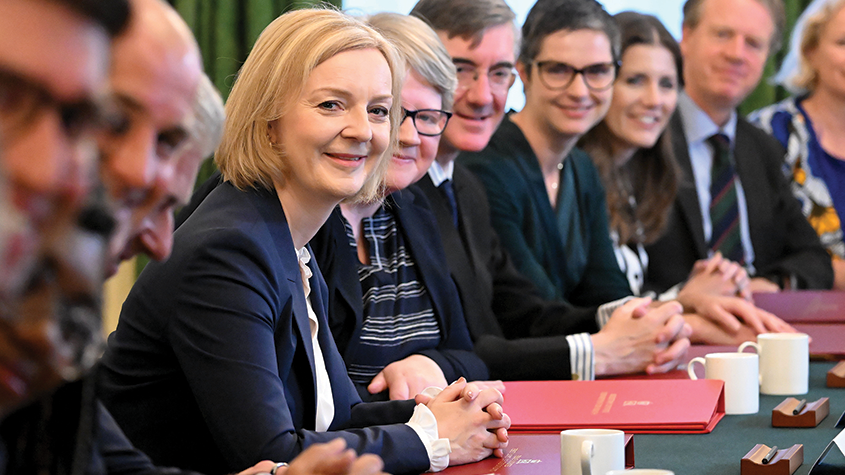Britain needs a nimbler health service
The NHS is the beating heart of this country, the prime minister told the nation. Perhaps, but major surgery is needed.

Get the latest financial news, insights and expert analysis from our award-winning MoneyWeek team, to help you understand what really matters when it comes to your finances.
You are now subscribed
Your newsletter sign-up was successful
Want to add more newsletters?

Twice daily
MoneyWeek
Get the latest financial news, insights and expert analysis from our award-winning MoneyWeek team, to help you understand what really matters when it comes to your finances.

Four times a week
Look After My Bills
Sign up to our free money-saving newsletter, filled with the latest news and expert advice to help you find the best tips and deals for managing your bills. Start saving today!
How is Britain coping?
At this stage, comparing Covid-19 fatalities in different countries, it is not obvious that the UK is doing a strikingly bad job at battling the coronavirus. This week there was much discussion of the fact that the UK’s death toll per million (which was 178 as of Wednesday lunchtime) is a bit more than twice Ireland’s (82). But Ireland’s population density is a quarter of the UK’s, the population is younger and far more rural and it has no massive conurbations or the global hub that is London. Our deaths per million are broadly the same as comparable countries such as the Netherlands (172) and less than half those in Belgium (383). In France, far less densely populated than the UK, the rate is 241.
So no need to worry?
Plenty of need to worry, given that the rate in Germany is less than a quarter of ours (42 per million), that recent daily death tolls are comparable with those of Italy and Spain at their peaks, and that the UK authorities’ initial laissez-faire response may well have cost lives.
The charge against the UK’s handling of the emergency is twofold. First, that the government’s initial strategy was uncertain, slow and badly communicated, squandering precious time. “It just wasn’t consistent,” says Martin Stuermer, a virologist, in the Financial Times. “They had this plan to allow life to go on but ensure that elderly people were protected. But then they abandoned that. And they weren’t prepared for mass testing. But the main problem was that the government just didn’t chart a clear course in this crisis – unlike the German government.”
MoneyWeek
Subscribe to MoneyWeek today and get your first six magazine issues absolutely FREE

Sign up to Money Morning
Don't miss the latest investment and personal finances news, market analysis, plus money-saving tips with our free twice-daily newsletter
Don't miss the latest investment and personal finances news, market analysis, plus money-saving tips with our free twice-daily newsletter
And the second charge?
That Britain’s national health service, and its broader health governance infrastructure, have proved too overly centralised and lumbering to respond nimbly and flexibly. It’s not all doom and gloom, of course. There might be “many disadvantages to centrally organising a healthcare system for 60-million-plus people”, says Helen Buckingham of the Nuffield Trust health think-tank. But an important “advantage is that, when you need to do command-and-control, you can, and you can do it quickly”.
So, for example, recent weeks have seen the mass redeployment of staff and flexing of capacity, the rapid ramping up of ICU capacity within existing hospitals and even the speedy building of emergency capacity at NHS Nightingale temporary hospitals in east London and across the country with the help of military planners and engineers. In places, red tape has been slashed to fast-track promising private-sector initiatives, notably the continuous positive airway pressure (CPap) machine developed by the UK-based Mercedes Formula One business.
But?
But that’s not the whole story. Elsewhere, and particularly when it comes to testing, the UK’s approach has been dangerously bureaucratic. There have been widespread reports that Public Health England has been reluctant to relax its state-financed monopoly on testing procedures, turning down – or even ignoring – offers of help from the private sector.
The contrast with Germany is stark. Some of Germany’s advantages arise from decades of higher health spending, plus a broader industrial and pharmaceutical base better equipped to scale up in extremis. But organisation and structures have also been crucial. According to Dr Christian Drosten of Berlin’s Charité University Hospital, quoted in a report from the Adam Smith Institute, “we have a culture here in Germany that is actually not supporting a centralised diagnostic system… Germany does not have a public health laboratory that would restrict other labs from doing the tests. So we had an open market from the beginning”. Meanwhile, on testing, the UK is still playing catch-up.
What can we learn from Germany?
First, we must come to value the virtues of planning and foresight, says Jürgen Maier, the British-Austrian former chief executive of Siemens UK. In 2016 a UK government pandemic modelling exercise, Cygnus, pointed to the potential collapse of NHS resources in a flu pandemic, but “the planners that should have been praised were largely ignored”, says Maier. Even as the crisis intensified three weeks ago, “we were told of 3.5 million already ordered antibody tests”, he says. “Most missed the small print that these tests had not yet been validated and they will probably never arrive.” Germany is not building any temporary hospitals because its capacity is coping and there are no shortages of protective equipment. Crucially, NHS England entered the crisis with only 3,700 critical care beds, half the European average – or 6.6 per 100,000 population, compared with Germany’s 29. And Germany is not having a weekly clap for its frontline clinicians, because “the truth is they feel appreciated all of the time. They are better paid” and “have got a much better resourced medical infrastructure behind them”.
So we should adopt the German system?
Covid-19 has tested the centralised NHS model “to destruction,” argues Daniel Johnson on The Article. Once the pandemic is over, we urgently need to examine ways of transitioning to the decentralised, social-insurance model that has served Germany so well in this global emergency, and create a more agile system that is more open to private-sector innovation. Unlike the top-down NHS model, the German model is based on government-backed, privately provided insurance “in a carefully regulated healthcare marketplace”. The aim would be to “preserve many of the best aspects of our NHS” – provision remaining free at the point of delivery – “while gradually encouraging younger generations to insure their families’ health through workplace schemes underpinned by the government”. The ultimate objective would be a “better-funded, more efficient, decentralised health service. Coronavirus has demonstrated that it is time, not merely for reform of the NHS, but for revolution”.
Get the latest financial news, insights and expert analysis from our award-winning MoneyWeek team, to help you understand what really matters when it comes to your finances.
-
 New PM Sanae Takaichi has a mandate and a plan to boost Japan's economy
New PM Sanae Takaichi has a mandate and a plan to boost Japan's economyOpinion Markets applauded new prime minister Sanae Takaichi’s victory – and Japan's economy and stockmarket have further to climb, says Merryn Somerset Webb
-
 Plan 2 student loans: a tax on aspiration?
Plan 2 student loans: a tax on aspiration?The Plan 2 student loan system is not only unfair, but introduces perverse incentives that act as a brake on growth and productivity. Change is overdue, says Simon Wilson
-
 Will UK interest rates fall in 2026? Latest Bank of England predictions
Will UK interest rates fall in 2026? Latest Bank of England predictionsThe Bank of England held interest rates at 3.75% in their February meeting. Will interest rates stay at this level, or will they fall further this year?
-
 Petrol prices explained: What makes up the price of a litre of petrol?
Petrol prices explained: What makes up the price of a litre of petrol?Briefings The cost of filling the average car with fuel is falling. Here’s what makes up the price of a litre of petrol.
-
 Mini-Budget: will Kwasi Kwarteng’s gamble on growth work?
Mini-Budget: will Kwasi Kwarteng’s gamble on growth work?Briefings The government has launched the biggest dash for growth in 50 years, relaunching an approach known as supply-side economics. What is the plan – and will it work?
-
 Energy Price Guarantee: Liz Truss’s gigantic state handout
Energy Price Guarantee: Liz Truss’s gigantic state handoutBriefings The PM railed against government-funded largesse on the campaign trail. Now she is introducing energy price guarantees that will cost more than furlough. Is that a good idea?
-
 One year later: how is Afghanistan faring under Taliban rule?
One year later: how is Afghanistan faring under Taliban rule?Briefings It’s been a year since the Taliban took back control in the country following the withdrawal of US troops. The outlook remains grim. Simon Wilson reports
-
 Neom megacity: Saudi Arabia’s vision of the future
Neom megacity: Saudi Arabia’s vision of the futureBriefings The kingdom is building a futuristic city in the desert, a key component of its plan to wean the economy off oil and woo tourists and global businesses. Could it work?
-
 How to solve Britain’s water crisis
How to solve Britain’s water crisisBriefings A drought has been officially declared across much of Britain, despite the fact that climate change is bringing more rain than ever. What’s going wrong?
-
 10 years on: how has the London Olympics “legacy” panned out?
10 years on: how has the London Olympics “legacy” panned out?Briefings The 2012 Games would benefit not just athletes and spectators, but the whole economy over the longer term, we were told at the time. Ten years on, how has that panned out? Simon Wilson reports.